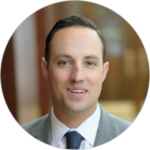New Member Spotlight: Georgia State University
UIDP welcomes Georgia State University as a member organization. With six campuses in the Atlanta metro area, Georgia State has greatly expanded its research program in the past decade, with investments increasing by more than 141% since 2010.
UIDP spoke with Jay Kahn, vice president of advancement and president of the Georgia State University Foundation, about his goals for membership in UIDP.
UIDP: What is GSU hoping to gain from this membership with UIDP in the coming year?
Kahn: For me, being new to GSU, it’s really a special place. We’re the largest university in the state of Georgia with 53,000 students, recognized for our commitment to teaching, and for three straight years we’ve been ranked as one of the top three most innovative universities in the country. As an R1, we have great programs in life sciences, computer science, and cyber security, etc., but for me, it still feels like we’re a well-kept secret when it comes to industry partnerships. So I hope that our UIDP membership helps us make those connections and gives us the resources to expand that work, especially when it relates to research and economic value.
UIDP: What are the current challenges that GSU is facing in the development of university-industry partnerships?
Kahn: I would look at it more as an opportunity rather than a challenge. The things we’re really well known for are our student success initiatives and our programs around diversity. We’ve eliminated all achievement gaps based on race, ethnicity, and income level. Over the last 10 years, we’ve increased graduation rates by 23 points overall, and by more than 30% for Black, Hispanic, and low-income students. We’re graduating 3,000 more students every year than we were 10 years ago. For the last six years, we’ve graduated more Black students than any other institution in the country that’s not-for-profit. When you think about our students, 68% are non-white, and 58% are Pell-eligible. We have a huge number of first-generation college-bound students on our campus. Our students are really amazing, and they graduate with a high level of career preparedness. They’re really sought after by industry, and that’s generated significant philanthropy for us.
We have strong recruiting and philanthropic relationships, but how do we expand that to a much more holistic level to include things like research, economic development, and workforce development? That’s the opportunity membership with UIDP offers—to help us do those things.
UIDP: Please tell us about a particularly successful U-I project or partnership.
Kahn: Our relationship with State Farm started many years ago when they first connected with our Robinson College of Business. It’s really grown successful with our student development and workforce development opportunities. One project out of that partnership is the Learning Income and Family Transformation (LIFT) Program, with aspects related to insurance, business, risk management, claims, and underwritings.
Since the consolidation of Georgia State University and Georgia Perimeter College in January 2016, the LIFT program has helped us raise our retention and graduation rates, increased enrollment of underserved populations, and improved workforce readiness and the academic areas key to State Farm’s business. This program has led to three times the number of students graduating from these academic programs, and State Farm has hired over 400 of our graduates.
One of the most interesting things about this relationship has really been scale. Not only has State Farm worked with the LIFT program, but also in many other areas of Georgia State, and I think there’s a ton of potential to grow. When you think about holistic partnerships, for example, we have a Risk Management program in our College of Business. It’s one of the best in the nation for research productivity. It’s just an instance where we have to be a lot louder about telling that story.
UIDP: What do you wish people knew about Georgia State that’s not widely known?
Kahn: One thing that is talked about a lot locally is that Georgia State has really transformed our section of downtown Atlanta. My office is located on Auburn Avenue, a neighborhood that is rich in history. It’s an important area of Atlanta that was largely vacant before.
The other fact is that we have a really robust infrastructure for research. In the life sciences, we have one of the only BSL-4 labs on a university campus in this country. There are only a handful of BSL-4 labs in the entire country. We have really capable research centers in a lot of fields, many related to life sciences such as neuroscience, diagnostics, molecular, and translational medicine. But we also have really great research programs that go beyond life sciences, with world-recognized faculty in public health, cybersecurity, public policy, analytics, etc.



